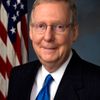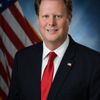Amy McGrath
Amy McGrath (Democratic Party) is running for election to the U.S. Senate to represent Kentucky. She is on the ballot in the Democratic primary on May 19, 2026.[source]
Biography
Amy McGrath attended Notre Dame Academy, a Roman Catholic high school for girls in Park Hills, Kentucky. She served in the United States Marine Corps from 1997 to 2017 and reached the rank of lieutenant colonel. McGrath earned a bachelor's degree in political science from the United States Naval Academy in 1997, a graduate certificate in legislative studies from Georgetown University in 2011, and a master's degree in international security from Johns Hopkins University in 2014. McGrath worked as a political science instructor in the United States Naval Academy and served as a congressional fellow in the United States House of Representatives, working as a defense fellow and adviser to Rep. Susan Davis.[1][2]
Elections
2026
See also: United States Senate election in Kentucky, 2026
General election
The primary will occur on May 19, 2026. The general election will occur on November 3, 2026. General election candidates will be added here following the primary.
The candidate list in this election may not be complete.
General election for U.S. Senate Kentucky
Christopher Campbell (Independent) is running in the general election for U.S. Senate Kentucky on November 3, 2026.
Candidate | ||
| Christopher Campbell (Independent) | ||
 = candidate completed the Ballotpedia Candidate Connection survey. = candidate completed the Ballotpedia Candidate Connection survey. | ||||
| If you are a candidate and would like to tell readers and voters more about why they should vote for you, complete the Ballotpedia Candidate Connection Survey. | ||||
Do you want a spreadsheet of this type of data? Contact our sales team. | ||||
Democratic primary
The candidate list in this election may not be complete.
Democratic primary for U.S. Senate Kentucky
The following candidates are running in the Democratic primary for U.S. Senate Kentucky on May 19, 2026.
Candidate | ||
| Joshua Blanton Sr. | ||
 | Charles Booker | |
 | Logan Forsythe | |
 | Amy McGrath | |
 | Dale Romans | |
 | Pamela Stevenson | |
 | Vincent Thompson | |
 = candidate completed the Ballotpedia Candidate Connection survey. = candidate completed the Ballotpedia Candidate Connection survey. | ||||
| If you are a candidate and would like to tell readers and voters more about why they should vote for you, complete the Ballotpedia Candidate Connection Survey. | ||||
Do you want a spreadsheet of this type of data? Contact our sales team. | ||||
Withdrawn or disqualified candidates
- Jared Randall (D)
- Joel Willett (D)
Republican primary
The candidate list in this election may not be complete.
Republican primary for U.S. Senate Kentucky
The following candidates are running in the Republican primary for U.S. Senate Kentucky on May 19, 2026.
Candidate | ||
 | Andy Barr | |
 | Daniel Cameron | |
| Anissa Catlett | ||
| James Duncan | ||
 | Mike Faris  | |
 | Val Fredrick | |
 | Jonathan Holliday | |
 | Jimmy Leon | |
 | Nate Morris | |
Andrew Shelley  | ||
| George Washington | ||
| Donald Wenzel | ||
 = candidate completed the Ballotpedia Candidate Connection survey. = candidate completed the Ballotpedia Candidate Connection survey. | ||||
| If you are a candidate and would like to tell readers and voters more about why they should vote for you, complete the Ballotpedia Candidate Connection Survey. | ||||
Do you want a spreadsheet of this type of data? Contact our sales team. | ||||
Withdrawn or disqualified candidates
- Mitch McConnell (R)
- Wende Kennedy (R)
- Jacob Trimble (R)
Endorsements
Ballotpedia is gathering information about candidate endorsements. To send us an endorsement, click here.
2020
See also: United States Senate election in Kentucky, 2020
United States Senate election in Kentucky, 2020 (June 23 Republican primary)
United States Senate election in Kentucky, 2020 (June 23 Democratic primary)
General election
General election for U.S. Senate Kentucky
The following candidates ran in the general election for U.S. Senate Kentucky on November 3, 2020.
Candidate | % | Votes | ||
| ✔ |  | Mitch McConnell (R) | 57.8 | 1,233,315 |
 | Amy McGrath (D) | 38.2 | 816,257 | |
 | Brad Barron (L) | 4.0 | 85,386 | |
 | Paul John Frangedakis (Unaffiliated) (Write-in)  | 0.0 | 70 | |
 | Daniel Cobble (Unaffiliated) (Write-in) | 0.0 | 18 | |
 | Randall Lee Teegarden (Unaffiliated) (Write-in) | 0.0 | 9 | |
| Total votes: 2,135,055 | ||||
 = candidate completed the Ballotpedia Candidate Connection survey. = candidate completed the Ballotpedia Candidate Connection survey. | ||||
| If you are a candidate and would like to tell readers and voters more about why they should vote for you, complete the Ballotpedia Candidate Connection Survey. | ||||
Do you want a spreadsheet of this type of data? Contact our sales team. | ||||
Withdrawn or disqualified candidates
- Derek Leonard Petteys (Reform Party)
- Alyssa Dara McDowell (Independent)
Democratic primary election
Democratic primary for U.S. Senate Kentucky
The following candidates ran in the Democratic primary for U.S. Senate Kentucky on June 23, 2020.
Candidate | % | Votes | ||
| ✔ |  | Amy McGrath | 45.4 | 247,037 |
 | Charles Booker | 42.6 | 231,888 | |
 | Mike Broihier  | 5.0 | 27,175 | |
 | Mary Ann Tobin | 2.0 | 11,108 | |
 | Maggie Jo Hilliard | 1.1 | 6,224 | |
| Andrew Maynard | 1.1 | 5,974 | ||
 | Bennie Smith  | 0.9 | 5,040 | |
 | Jimmy Ausbrooks  | 0.7 | 3,629 | |
 | Eric Rothmuller  | 0.6 | 2,995 | |
| John Sharpensteen | 0.5 | 2,992 | ||
| Total votes: 544,062 | ||||
 = candidate completed the Ballotpedia Candidate Connection survey. = candidate completed the Ballotpedia Candidate Connection survey. | ||||
| If you are a candidate and would like to tell readers and voters more about why they should vote for you, complete the Ballotpedia Candidate Connection Survey. | ||||
Do you want a spreadsheet of this type of data? Contact our sales team. | ||||
Withdrawn or disqualified candidates
- Kevin Elliott (D)
- Loretta Babalmoradi Noble (D)
- Matt Jones (D)
- Joshua Paul Edwards (D)
- Steven Cox (D)
Republican primary election
Republican primary for U.S. Senate Kentucky
The following candidates ran in the Republican primary for U.S. Senate Kentucky on June 23, 2020.
Candidate | % | Votes | ||
| ✔ |  | Mitch McConnell | 82.8 | 342,660 |
 | C. Wesley Morgan | 6.2 | 25,588 | |
| Louis Grider | 3.3 | 13,771 | ||
 | Paul John Frangedakis  | 2.9 | 11,957 | |
| Naren James | 2.6 | 10,693 | ||
| Kenneth Lowndes | 1.3 | 5,548 | ||
| Nicholas Alsager | 0.9 | 3,603 | ||
| Total votes: 413,820 | ||||
 = candidate completed the Ballotpedia Candidate Connection survey. = candidate completed the Ballotpedia Candidate Connection survey. | ||||
| If you are a candidate and would like to tell readers and voters more about why they should vote for you, complete the Ballotpedia Candidate Connection Survey. | ||||
Do you want a spreadsheet of this type of data? Contact our sales team. | ||||
Withdrawn or disqualified candidates
- Karl Das (R)
- Wendell Crow (R)
Libertarian convention
Libertarian convention for U.S. Senate Kentucky
Brad Barron advanced from the Libertarian convention for U.S. Senate Kentucky on March 7, 2020.
Candidate | ||
| ✔ |  | Brad Barron (L) |
 = candidate completed the Ballotpedia Candidate Connection survey. = candidate completed the Ballotpedia Candidate Connection survey. | ||||
| If you are a candidate and would like to tell readers and voters more about why they should vote for you, complete the Ballotpedia Candidate Connection Survey. | ||||
Do you want a spreadsheet of this type of data? Contact our sales team. | ||||
2018
General election
General election for U.S. House Kentucky District 6
Incumbent Andy Barr defeated Amy McGrath, Frank Harris, Rikka Wallin, and James Germalic in the general election for U.S. House Kentucky District 6 on November 6, 2018.
Candidate | % | Votes | ||
| ✔ |  | Andy Barr (R) | 51.0 | 154,468 |
 | Amy McGrath (D) | 47.8 | 144,736 | |
 | Frank Harris (L) | 0.7 | 2,150 | |
 | Rikka Wallin (Independent) | 0.3 | 1,011 | |
| James Germalic (Independent) | 0.2 | 523 | ||
| Total votes: 302,888 | ||||
 = candidate completed the Ballotpedia Candidate Connection survey. = candidate completed the Ballotpedia Candidate Connection survey. | ||||
| If you are a candidate and would like to tell readers and voters more about why they should vote for you, complete the Ballotpedia Candidate Connection Survey. | ||||
Do you want a spreadsheet of this type of data? Contact our sales team. | ||||
Withdrawn or disqualified candidates
- Mikel Bradley (Independent)
Democratic primary election
Democratic primary for U.S. House Kentucky District 6
The following candidates ran in the Democratic primary for U.S. House Kentucky District 6 on May 22, 2018.
Candidate | % | Votes | ||
| ✔ |  | Amy McGrath | 48.7 | 48,860 |
 | Jim Gray | 40.5 | 40,684 | |
 | Reggie Thomas | 7.2 | 7,226 | |
 | Geoff M. Young | 1.6 | 1,574 | |
 | Daniel Kemph | 1.2 | 1,240 | |
| Theodore Green | 0.8 | 835 | ||
| Total votes: 100,419 | ||||
 = candidate completed the Ballotpedia Candidate Connection survey. = candidate completed the Ballotpedia Candidate Connection survey. | ||||
| If you are a candidate and would like to tell readers and voters more about why they should vote for you, complete the Ballotpedia Candidate Connection Survey. | ||||
Do you want a spreadsheet of this type of data? Contact our sales team. | ||||
Republican primary election
Republican primary for U.S. House Kentucky District 6
Incumbent Andy Barr defeated Chuck Eddy in the Republican primary for U.S. House Kentucky District 6 on May 22, 2018.
Candidate | % | Votes | ||
| ✔ |  | Andy Barr | 83.8 | 40,514 |
 | Chuck Eddy | 16.2 | 7,858 | |
| Total votes: 48,372 | ||||
 = candidate completed the Ballotpedia Candidate Connection survey. = candidate completed the Ballotpedia Candidate Connection survey. | ||||
| If you are a candidate and would like to tell readers and voters more about why they should vote for you, complete the Ballotpedia Candidate Connection Survey. | ||||
Do you want a spreadsheet of this type of data? Contact our sales team. | ||||
Campaign themes
2026
Ballotpedia survey responses
See also: Ballotpedia's Candidate Connection
Amy McGrath has not yet completed Ballotpedia's 2026 Candidate Connection survey. Send a message to Amy McGrath asking her to fill out the survey. If you are Amy McGrath, click here to fill out Ballotpedia's 2026 Candidate Connection survey.
Who fills out Ballotpedia's Candidate Connection survey?
Any candidate running for elected office, at any level, can complete Ballotpedia's Candidate Survey. Completing the survey will update the candidate's Ballotpedia profile, letting voters know who they are and what they stand for. More than 25,000 candidates have taken Ballotpedia's candidate survey since we launched it in 2015. Learn more about the survey here.
You can ask Amy McGrath to fill out this survey by using the buttons below or emailing info@amymcgrath.com.
2020
Ballotpedia survey responses
See also: Ballotpedia's Candidate Connection
has not yet completed Ballotpedia's Candidate Connection survey.
Who fills out Ballotpedia's Candidate Connection survey?
Any candidate running for elected office, at any level, can complete Ballotpedia's Candidate Survey. Completing the survey will update the candidate's Ballotpedia profile, letting voters know who they are and what they stand for. More than candidates have taken Ballotpedia's candidate survey since we launched it in 2015. Learn more about the survey here.
Help improve Ballotpedia - send us candidate contact info.
Campaign website
McGrath's campaign website stated the following:
| “ |
COVID-19 The coronavirus pandemic has exposed cracks in our economic, health and political systems and shown how much work needs to be done to prepare us for and protect us from the threats of the 21st century. Our responses moving forward must be focused on both safety and equity. Mission: Rebuilding Kentucky Mitch McConnell has abandoned Kentucky during this crisis. Amy has a vision for coming back stronger than before. Health Care I believe health care should be affordable and accessible to all Americans. In the same way that basic education is the foundation of a strong country, health care affects our nation’s competitiveness and security. Equality for All Our country has a long way to go to fulfill our Constitution’s promise of equality for every American. Education A path to the middle class has been all but cut off for far too many families by the lack of jobs accessible to them and the failure of wages to keep pace with the rising costs of living. We must start investing in the basics again—education and training—so that financial stability is back within the grasp of all Kentuckians. Clean Up Washington At a time when five out of six Americans don’t trust their government to do the right thing, I believe that anyone running for office must start by establishing trust and demonstrating a true commitment to listening to constituents and to cleaning up Washington. Securing Our Economic Future For all of its beauty, Kentucky has its share of economic problems—problems that threaten our future and the future of our children. In the face of rising inequality, economic strife, and lack of opportunity, our middle class is shrinking and the American dream is increasingly out of reach. Foreign Policy & National Security The challenges that our nation faces around the globe today are complex—and they require us to have leaders who clearly understand the nature of our changing world and of conflict. Climate Change Climate change and resource scarcity are with us today — we already have climate change refugees in America. Scientists around the world know it, and the United States military is already testing, adapting, and researching how to operate and succeed in these rapidly changing environments. Veterans & Military Families During Sen. McConnell’s time in office, he has repeatedly sided with special interest groups and voted against legislation that could have helped veterans. Guns I am a gun owner and pro-Second Amendment. I went to combat with a 9 millimeter strapped to my chest and a 20 millimeter cannon on the front of my jet. But at the same time, I'm the mother of three small kids, and my kids have to practice school shooting drills. Immigration The current immigration crisis is the product of a growing number of migrants who have come to the Southwest border without papers fleeing violence by the drug cartels. Student Debt Higher education costs have increased eight times faster than wages, making it impossible for many Americans to get the education they need to succeed without taking on massive high-interest loans. A national service program is a practical solution for college debt that allows young people to give back to their communities in exchange for a debt-free higher education. |
” |
| —Amy McGrath's campaign website (2020)[4] | ||
2018
Campaign website
McGrath's campaign website stated the following:
| “ |
Health care The Affordable Care Act (ACA) is far from perfect, but it did enable many Kentuckians, especially those with pre-existing conditions, to acquire affordable health insurance for the first time. As a result, the uninsured rate in Kentucky dropped from over 20% to barely 5%. That’s nowhere near “failing,” as the Republican Party and President Trump continue to claim. But the GOP campaigned on the dishonest notion that the ACA was in a "death spiral" and they had something better and cheaper to “replace” it: Trust them. We all know now, that was a lie. The House bill that my Republican opponent, Andy Barr, said he would “enthusiastically vote for” would have thrown 23 million Americans off health coverage. Overwhelmingly, doctors, nurses, and healthcare organizations in America have opposed each of the Republican bills this year. Their efforts would especially hurt veterans, where 1 in 10 use Medicaid, and mental health conditions like PTSD would be considered a preexisting condition. The American Medical Association not only opposed the GOP efforts, but went so far as to say it violated their medical standard of “do no harm!” Ironically, the “repeal and replace” effort is also terrible for jobs. Under Senator McConnell’s original Senate bill, Kentucky would have experienced a net loss of 231,400 jobs, all of this so that the wealthiest Americans could have another massive tax cut. The GOP has been unapologetically trying to revert back to a time when people would have to mortgage their homes if they got sick. Insurance I believe firmly that the goal must be universal coverage for all Americans. But we need an honest and meaningful debate over how to get there. I side firmly with former Kentucky Governor Steve Beshear, the man who implemented the ACA in a manner that made Kentucky the gold standard among states as far as how it’s supposed to work. Beshear said recently, “If we were starting from scratch, I would be for single-payer, too…. But we aren’t starting from scratch. There are too many stakeholders to be able to sweep them away and begin all over again.” In fact, currently proposed single-payer legislation would represent such a sweeping overhaul that it would put our healthcare system into massive upheaval. I do not support such an approach. Perhaps it’s the military officer in me that takes a more pragmatic approach on this issue. Every major piece of legislation in our country has needed fixes along the way: Social Security and Medicare were not created perfect. We have expanded opportunities and overcome challenges in every generation. In each case, Americans didn’t quit because we didn’t have every answer to start with; instead, we redoubled our efforts, worked together, and found ways around problems and obstacles. That is the American way. We don’t simply throw things away that we believe are imperfect. We work over time – in the words of the Constitution itself – to make them “more perfect.” So, I remain committed to working in a bipartisan way to fix the problems with the Affordable Care Act, which brought down Kentucky's uninsured rate in a dramatic way. But any fixes must maintain current essential health benefits without allowing states to waive them, not impose any annual or lifetime coverage caps, and must continue the ACA’s prohibition against insurers charging higher premiums based on factors such as health status or pre-existing conditions. The voters expect us to put aside our partisan differences and work together to address rising premiums and deductibles, while maintaining the current guarantees for pre-existing conditions. This is critical. In the military, we don't care whether you're a Democrat or a Republican when it comes to completing our mission. I will bring that same sense of purpose to Congress, when elected. I favor approaches to bridge some of the single-payer/Obamacare divide, and begin a longer process that may take us in that general direction. Here are some steps we can take: Medicare buy-in The health care debate has been especially frightening for middle aged Americans who have not reached Medicare age. Faced with the skyrocketing premiums that the reckless GOP plans would impose, older Americans too often must confront an impossible choice: spending a large chunk of the retirement nest egg to purchase coverage, or go without coverage and pray nothing happens until they reach 65 and can join Medicare. A Medicare buy-in would provide some peace of mind for the more vulnerable Americans who have some of the greatest, and most expensive, health care needs. And taking some middle aged Americans out of the risk pool would help greatly lower premiums for those under 55. Public option That’s why I also support a so-called “public option” to create a government-run health insurance agency that would compete with other private health insurance companies within the country. A major reason for a public option — beyond the effect of generally lowering premiums since government would not be trying to make a profit — would be to guarantee that in those counties with just one or two insurers, rates could not be artificially spiked because of lack of competition. Plus, this gives people more choice in the health insurance market. No one would be forced to go with the government-run plan, but it would be there if Americans wished to choose it. It is worth remembering that both the public option and the Medicare buy-in were initially part of the Affordable Care Act, but were removed because of the threat of a filibuster. To improve Obamacare, we need to return to this original conception. Foreign policy As a former military officer, protecting America was the business I lived in my entire adult life. Today, we face many global challenges that require us to have leaders who clearly understand the nature of our changing world. American values Changing global environment Economic power is shifting from West to the East. Nations in the East like China, will have more money for its military and more power. World population demographics are rapidly changing. Western nations are becoming older. A youth bulge in developing nations, along with rapid urbanization in many parts of the globe, will create many ungoverned spaces that become the breeding ground for jihadist radicalism and crime and will be the platforms for future attacks on the United States. Non-state actors will use the rise of technology to proliferate their ideology and to physically attack our networks. Furthermore, non-state actors could potentially attack our allies, and us, using new weapons we are only imagining today. We need to maintain a strong military and a strong diplomatic and development corps. Climate change is a national security issue. Climate change and resource scarcity is with us today. It’s not a theory, it’s a fact. For some reason, my opponent, and the Republican Party in general, have concluded this might be just a Chinese hoax. It’s not. Scientists around the world know it, and the United States military recognizes what science says and it is already testing, adapting, researching how to operate and succeed in these rapidly changing environments. We are seeing the effects of it now: The Earth is getting warmer. Last summer was the hottest in history and 8 of the last 10 summers were the hottest in history. Sea levels are rising. This will not only affect massive numbers of people who live on the world’s coastlines, but this will affect our national security potentially more than any other factor. Our naval bases around the globe are seeing the effects now. Ten times a year, floods cripple our Norfolk Naval Base. Key West Naval Air Station (where I learned to dogfight in the F/A-18) will be almost completely under water in the next 70 years. Weather patterns are changing. We are seeing hurricanes, floods, and fires in ways we’ve never seen before. Large parts of the world (Middle East, Africa, Southeast Asia) are seeing dramatic desertification at an alarming rate. This means less food will be produced and large movements (migrations) of people will be forced out of the lands they occupy today. In the 20th century, we fought wars over values or economic clashes. In the 21st century, it will be over water and resources. This is the world we will live in. This is the world our children and grandchildren will face. We can’t afford to be isolationist. We can’t afford to look other way, and we can’t afford to keep denying this challenge exists. This is the world's future and we have to adapt! We must lead the world in planning for the effects of climate change and working hard to mitigate them. This should not be a political issue. This is an American issue and a global issue. We need leaders that get it. NATO The world has seen many failed alliances (League of Nations, Warsaw Pact) – but NATO isn’t one of them… yet. I’ve worked with these nations during my deployments. NATO has only invoked Article 5 once and that was when the alliance stood with us after the attacks of September 11, 2001. They were all right there with us, in tents in Afghanistan, and we need to be there for them. We live in an interconnected world, where a fruit vendor in Tunisia can start an uprising in an entire region! We need strong alliances to face the global challenges ahead, and NATO is the most capable alliance in world history. It’s critical because it’s values-based. Freedom, democracy, rule of law, and liberty are pillars of the organization. NATO isn’t a business deal. It’s not about shared business interests, profit, and power. It’s about shared VALUES, and that’s what makes it so strong and powerful. ISIL/ISIS and radical jihadist extremism This will be a long-term fight, and one where we must be patient. We cannot give them propaganda like President Trump’s Muslim Ban, which is fueling the jihadists’ rhetoric of the United States waging war on Islam. Every time US leadership makes strategic errors like this, ISIS gains more recruits for its cause, crushing our hard fought tactical gains on the battlefield. Ultimately, ISIS and the jihadist groups are a symptom of something larger: the deterioration of the human condition in many parts of the world today. The only way to realistically counteract ISIS, and jihadist groups, is a combination of force and helping areas that are the breeding ground for jihadism. Helping means pressing states and leaders to develop the institutions and mechanisms that develop good governance, electoral legitimacy, and anything that broadens who is allowed political power and voice. Furthermore, we must push for sustainable political solutions in places like Syria and Iraq. The full, and even greater funding of the US State Department, USAID, and development non-governmental organizations (NGO), is as important to our national security than simply a strong military. These agencies of our government must be equipped to partner with local actors to turn populations against extremism and build stronger deradicalization programs. That's the only thing that will turn the tide against jihadist groups. It will not happen with force alone, and it will not work simply by throwing money at local populations. We have to build the local capacity strategically, and this is something that USAID and State know how to do. My opponent, who is on the House Financial Services Committee, voted to withhold funding for important institutions such as the World Bank that help development in Middle East countries. Actions like this show that many in Congress do not understand the strategic nature of the fight we are engaged in. Wars are expensive. Combating terrorism from failed states is expensive. Foreign development aid is the “cheapest insurance policy” we can buy as a country. I’m in full agreement with Secretary of Defense (and former General) James Mattis when he says, if we cut foreign aid, then we need to “buy more ammunition.” (Read my published thoughts on preventative war and the Iraq invasion of 2003: [1]) Afghanistan However, we need leaders with a robust understanding of this conflict who will push the Administration to utilize other government agencies, not just military. If there is one takeaway I’ve gained after fighting in Afghanistan and Iraq in multiple combat deployments, it’s this: the military cannot “win” this alone. It’s going to require various elements of national power, some of which have been vastly underfunded in recent years (diplomacy, development agencies) by members in Congress who haven’t a clue about the nature of the threats we face today. Iran The US along with the rest of the world (specifically the UK, France, China, Russia, and Germany) successfully negotiated with Iran to constrain its growing nuclear program. Recently, our Chairman of the Joint Chiefs, General Dunford, said Iran is in compliance with its obligations under the deal, and Secretary of Defense Mattis has indicated that pulling out of the deal would not be in our interests. I am in full agreement with both. The deal sharply constrains Iran’s nuclear program and provides for strict inspections that the international community has never been granted before. The best way to ensure a nation does not have nuclear weapon capability is through inspections. If the “Iran deal” goes away, the inspections will go away and we will have no way of knowing the extent of Iran’s nuclear capability. Additionally, the rest of the world will not reinstate sanctions if the US unilaterally pulls out. Pulling out would be a loss for us on all fronts. Iran would get its economy back and be able to develop a nuclear weapon, while we would lose all of our credibility in seeking a diplomatic resolution to other conflicts such as the current North Korea nuclear crisis. Bottom line: Diplomacy avoided another war in the Middle East and averted the kind of crisis we now face with North Korea. It’s working. Let’s not throw it away. Israel I had the opportunity to spend the summer of 2015 in Israel leading a group of American cadets and midshipmen traveling with the IDF (Israeli Defense Force) to gain a further understanding of the region. The survival and security of Israel is in the United States’ interest and a two-state solution to the Israeli-Palestinian conflict is fundamental to Israel’s security. Additionally, I’m in full support of maintaining Israel’s QME (Qualitative Military Edge) and strengthening our nation’s special relationship based on shared values. North Korea So, how do we handle it? Carefully, deliberately, and with all elements of national power. We know Kim Jong-un is a cruel leader, but there is no evidence that he is suicidal, or cannot be deterred. His quest for nuclear weapons is spurred by one thing, the survival of his regime. We must recognize that North Korea has possessed formidable conventional, chemical, and biological capabilities for decades without using them. Kim knows that any large conflict would wipe his regime out, making it highly unlikely that he would start one. We shouldn’t either. A preventative war would be a disaster given the millions of innocent people (including thousands of Americans) who would be killed in South Korea and Japan. We need to be very deliberate and careful when dealing with this nuclear regime. Our President prides himself on his unpredictability in foreign policy. Unpredictability between nuclear weapon capable states is extremely destabilizing. The President’s rhetoric and tweets are immensely dangerous to the well being of our people and our country. The US has other options between doing nothing and all out war. We could use our offensive cyber capabilities to degrade North Korea’s nuclear arsenal, increase our missile defense capabilities in the region, or even coordinate a naval blockade to put an even tougher economic squeeze on the regime. No matter what we do, we should do it with the cooperation of our partners and allies as well as with the cooperation of China and Russia. China certainly does not wish to see a war on the Korean peninsula either. It is critical that the approach to North Korean nuclear progress should be a rest of the world vs. North Korea, not just a US vs. North Korea. World sanctions against Iran worked because they were not unilateral. We need the same multi-national approach here. Russia Right now, we need a 9/11-style commission to find out and address the extent of Russian involvement in the 2016 elections. This was an attack within our borders on the very linchpin of our democratic stability, and Russia will try it again. We need to know what happened, how and why it happened, and call it out with a response. As an American, I’m extremely disappointed the Republican majority in Congress has failed to address this national security threat. Remember, we had 33 Congressional hearings exhausting all aspects of the Benghazi disaster in Libya. Where is the same emphasis to investigate this attack and our failure as a nation at defending against it? Our current administration is failing to take this threat seriously (for obvious reasons). It's Congress’ job to stand up, take action here when the President is unwilling to protect our American democratic elections. China At the same time, the US has a special interrelated economic relationship with China. We also need to work with China to stem North Korea’s nuclear weapon progress. When the current administration pulled out of the strategic partnership of the TPP, the US lost influence in the Pacific. If the United States is pushed out of Asia (which is what China would want), we would lose our influence in that crucial part of the world. China would gain more power, trade will be harder, we might not be in a position to respond should a major development occur. Sexual harassment First, we cannot let it become a partisan issue. Otherwise, it will become a political football and never be dealt with by our society, and we lose a crucial opportunity for meaningful reckoning, healing, and education. This affliction doesn’t fall along partisan lines — Roy Moore, John Conyers, Harvey Weinstein, Charlie Rose, Al Franken, Donald Trump, and the list goes on. All inappropriate physical harassment perpetrated by those in power upon women (or men) is wrong and cannot be tolerated, and predatory behavior towards children/teenagers, as is alleged in Alabama regarding Roy Moore, should be treated for what it is — outright child molestation. This cultural shift may well represent a watershed moment. It is likely that more women will speak out against prominent political and establishment figures, and they should. We've come to learn that predatory behavior doesn’t typically happen just once. When the first courageous person decides to speak out, we have to expect that more will follow and what we have been ignoring in our workplaces and professions for some time will begin to surface. We have to resist the natural impulse to give the benefit of the doubt for those we tend to like, but not those on the other side. Bad behavior by Democrats should not be viewed as less detrimental to us than by those we disagree with politically. We had (and continue to have) this problem in our military. I lived through times in my career where the culture was such that speaking out was certainly not in the best interest of one's career. Be silent, look the other way, don't cause waves, brush it off...these were all coping mechanisms for many women in the military. But the military has made strides in this area and I could see a real positive difference during my 24-year career. In my experience, the very best way to combat this type of behavior is for leaders to foster an environment of respect for all, and one where anyone can feel like he/she can come forward (without repercussion) should there be sexual harassment or assault. That means leaders must make known their expectations that the behavior will never be tolerated nor covered up, and of course follow through with it (even when the perpetrator is someone high ranking or well known to the leader). Also, it was only when women began to rise in the officer and enlisted ranks that the systemic harassment and hazing began to subside in the units that had women. When the military ranks were largely an all-boys club, this behavior went largely unchecked. It was the promotion of more senior women officers and senior enlisted that made a difference. That's an incredibly important lesson. When we see more women in places like corporate board rooms and elected to office, it will be harder to get away with abusive behavior. Finally, we have to look out for each other, regardless of gender. Each of us (men and women) can make a real difference when we stand up, say something, and refuse to look the other way. Often, it takes only one person to intervene. When the perpetrator is the person in power, we have to foster a society where people can come forward and hold their leaders publicly accountable too. That’s what we all need to do here. Medical marijuana & legalization I also strongly believe that we need more research into its efficacy in treating these ailments that veterans, and others, face. It may also alleviate some of the dependence on opioids for pain relief and that, alone, is a meaningful reason to consider moving in that direction. On the issue of full legalization, I’d like to see our government permit full research on the subject. The Schedule 1 classification means that we can’t even conduct studies on the effect of legalization. Perhaps it’s the military officer in me, but I’m all about thoughtful planning and research before diving head first into fully opening that door. But I hope the state — and the federal government — begin to relax its unnecessarily rigid position on medical cannabis. Guns Over the past few months, I've been asked a few times about whether I would ever seek the NRA's endorsement or accept campaign contributions from them? The answer is No. Arguably, the greatest barrier to making progress on so many issues comes down to the power of the special interests, and the greater opportunity for making money, the greater the influence of their campaign money on our elected officials. Think about what the oil and gas industry has done to efforts to tackle climate change, or the power of Big Pharma on drug prices. The gun lobby (primarily the NRA) is arguably the most powerful of all special interests. In the early 2000s, I was actually an NRA member for a period of time. Back then, the NRA was about gun owners. Today, it has morphed into a lobbying group for commercial gun manufacturers. I don't recognize the current version of the group. The gun lobby's mere ability to stifle any reasonable efforts towards tackling the epidemic of gun violence is the greatest obstacle we face in dealing with gun safety and strong policing of existing laws. When it is able to maintain a 22-year federal ban on agencies like the CDC using funds to study the problem from a public health standpoint, it is preventing us from even having an informed starting point for discussions, and last year's sabotaging of bipartisan legislation to improve the gun-sale background check system — right after two horrific mass shootings (Las Vegas and the Texas church massacre) — should remind us that this is as much Congress' fault as it is the deranged mass killers who use the weapons. For example, federal law requires you to be 21 to purchase a handgun, but in many states anyone 18 or older can buy the AR-15, a semi-automatic version of the military’s M16, on which I was trained. That means a 19-year-old can’t buy a beer and can’t buy a handgun, but can buy an assault weapon. As a nation, we desperately need to have a conversation about guns where we bring to the table the concerns of both those in the cities as well as the rural areas. Beyond the common sense measures that should have been enacted long ago that even gun owners support (background checks for private sales and gun shows, barring purchases from anyone on no-fly or watch lists, meaningful efforts to keep guns out of the hands of felons, domestic abusers, and the mentally ill, and funding our CDC and NIH to study the epidemic as it does every other scourge), we need a honest conversation about what are willing to tolerate as a nation. When do we discuss who should have access to what are essentially weapons of war (like the AR-15)? Or high-capacity magazines? What about the value of a federal database of gun sales, or a broader discussion about concealed carry? Or an analysis of the benefits and costs to mandatory liability insurance, like we do most other things that we own that can injure others? We need to have an adult conversation as a nation, and we must have input from people with different points of view — without the gun lobby dictating the terms. But it's time for all of us to come to the table and talk it through. We simply can't do that as long as the gun lobby continues to buy off politicians. We also need members of Congress who have some credibility from both sides of this debate, haven't sold their political soul to the special interests in advance, and who respect rural culture and its unique relationship on this issue. [Posted on October 6, 2017] I fear that if a mass gun killing of school kids at Sandy Hook Elementary won’t spark an honest national dialogue about guns, then I don't know what will. As a gun owner, I very much respect the constitutional issues at stake. They're important. But as a mother of three young children, I am terrified by our unwillingness to deal with gun violence, both the mass shootings and the thousands killed by handguns in our cities each year. I'm not going to suggest there are easy fixes to these protracted issues. Even if you stopped mass shootings, what about all the handgun violence? Lawful gun owners shouldn't be penalized for the actions of bad or ill people. But this is an American problem, not that of a single political party, and it requires us to sit down together to find solutions where everyone must give a little from their preferred position. Otherwise, we let the fringes dictate the terms of this debate, and everyone loses — except them. We should begin with the items that have overwhelming public support: tighten enforcement when it comes to preventing the mentally ill from purchasing any weapons, bar purchases by people on no-fly or terror watch lists, and if you have to undergo a background check at a licensed gun dealer (as I have), you should not be able to evade that by obtaining a weapon at gun shows or privately. Otherwise, background checks are worthless. I also support current efforts to restrict alterations on firearms to get around federal restrictions, like bump stock. Beyond those initial measures, we need our leaders to show allegiance to the voters, not to special interests, and sit down and work together on long-term solutions. This is not going to be solved overnight. Money in politics The corrosive influence of big money is slowly destroying the democracy our Founders intended. Big money drives lawmakers to cower to special interests, and mutes the conversations needed for public good. Citizens United was one of the worst Supreme Court decisions in modern history. The Court’s decision allows a tidal wave of unlimited and undisclosed donations by corporations under the guise of “free speech.” The Court wrongly believed that a company’s million-dollar campaign donation would not dictate the policy decisions of elected officials. This terrible decision effectively allows an election to be bought. How? By corporations, wealthy individuals, and foreign entities like Russia sinking millions of dollars in the form of countless ads promoting or attacking a candidate to sway voters. The donors lack of “connection” to a campaign allows them to dodge taking responsibility for their “free speech” even if that speech is 100% lies. All the while, American voters may never find out that their election had been heavily influenced by a corporate or foreign agenda. Damage to democracy Think about that for a second. That’s staggering. The question is, what does this do to our democracy? I see three major effects. First, large undisclosed, unlimited corporate donations directly undermine the wants and needs of the people. Because of these donations, special interests groups have an enormous influence over politicians at the expense of real people. This means higher prescription drugs, lower wages, weak consumer protection - the list goes on and on. Second, big money forces members of Congress to constantly raise more money for their next campaign. They spend 70% of their time fundraising. The person you elected to represent you, to understand the issues, to meet with you, to attend hearings in overseeing the executive branch (as per the Constitution of the US), and the person who is paid $174,000 to do so, is only spending 30% of his or her working time actually working for you! Third, elected offices are held mostly by those who cave to special interests or are millionaires themselves. The cost of political campaigns has skyrocketed in the past two decades. In 2000, the average House campaign cost just under $700,000. In 2016, it was $1.5 million. This makes running for office almost completely out of reach for anyone who is not a millionaire, does not come from a family of politics, and/or is not bought by special interests. My race The incumbent Republican congressman gets 97% of his campaign money from special interests, corporations, and large donors, including a staggering $796,171 from the Financial, Insurance, and Real Estate industries in the 2016 cycle alone — three of the largest interest groups. Only 3% of his donations, since he was elected to Congress in 2012, have come from individual donors who gave less than $200. Meanwhile, one of my main Democratic primary challengers is a multi-millionaire who can simply write a personal check to cover his campaign expenses, as he has in his past campaigns. Both are establishment politicians who don’t need or seek small donations in significant numbers. In other words, neither need regular people to fund their campaigns. In contrast, after just 5 months in the race, my campaign had 16,000 donors, of which nearly 13,000 gave $50 or less, and half of the overall money we have raised have come from small donors. That’s democracy speaking. We need to get back to that. Curing the corrosive effects of money 1. We must hold our elected officials accountable for succumbing to these special interest groups. It is their responsibility to act in the interest of their constituents not corporations. 2. Elect leaders who believe money in politics to be a major issue, and elect leaders who campaign with the help of the people, not corporate interests. 3. A Constitutional amendment to reign in money in politics, even though such an amendment is unlikely today. As a member of Congress, I will work to pass campaign finance reform every chance I can. But passing any law at the federal level will be challenged in court and that means Citizens United must be overturned. To do that requires a Supreme Court that is more progressive. This is one of the major reasons why who we elect as President is critical. 4. Until we can overturn the harmful Citizens United ruling, we must express support for legislation that piece-by-piece dismantles the some of the ramifications of the ruling. Specifically, here are several items moving through the House of Representatives that are working today to remove big money from politics. I pledge to support them if I am elected to Congress:
In the meantime, I will continue to do everything I can to heighten awareness of this issue and increase awareness on laws that counter the excessive money in our political campaigns. This is a solvable problem, and is not a partisan issue. Fixing it will require citizens and politicians alike who love our country and demand structural reform before our democracy is destroyed. Climate change And it’s not just scientists around the world who know it. The United States military recognizes it – and realizes that it poses a serious challenge to our national security. That’s why our military is already testing, researching, and adapting operations to succeed in these rapidly changing environments. A changing climate has had and will continue to have hugely disruptive effects not only on the environment, but also on migration patterns, economies, disease vectors, and political unrest around the world. All of these dramatically affect our country’s safety, security and well-being. We are already experiencing these effects: The Earth is getting warmer. Eight of the last ten summers have each been the hottest in history, and last summer was the hottest ever recorded. Sea levels are rising. This will affect massive numbers of people who live on the world’s coastlines, creating climate refugees, economic challenges, epidemics and pandemics, and geopolitical upheavals on a scale never before seen. Climate change is coming and we can’t afford to look the other way. Our naval bases around the globe are seeing the consequences now. Ten times a year, floods cripple our Norfolk Naval Base. Key West Naval Air Station – where I learned to air-to-air dogfight in the F/A-18 – will be almost completely under water in the next 70 years. Weather patterns are creating hurricanes, floods, and fires in ways we’ve never seen before and that will both affect and in some cases demand military responses. Large parts of the world, including the Middle East, Africa, and Southeast Asia, are undergoing dramatic desertification at an alarming rate, meaning less food will be produced and large migrations will occur as people will be forced out of the lands they occupy today. In the 20th century, we fought wars over values or economic conflicts; in the 21st century, it will be over food, water and resources. Another reason climate change is a national security concern is its huge impact on our economy. Rising sea levels will alter global shipping patterns, severe weather will affect the ability of goods to be produced and transported, and markets, particularly for energy, are shifting as nations work to address and mitigate these changes. All of this is why the Trump Administration’s decision to slash research on sustainable, clean sources of energy is so wrong-headed and concerns me – and should concern every patriotic American. Both from a security and an economic standpoint, we need to invest in renewable energy. Our military is already one of the biggest proponents of renewable energy research. Why? Because it saves lives – and makes more strategic sense – if forward operating bases overseas do not have to be constantly refueled with traditional forms of energy like petroleum, which require vulnerable ground supply lines and are subject to potentially volatile markets. Both militarily and economically, the US must be a world leader in renewables investment or we will cede the future energy industry – and our national security – to China, which is developing in this area at a rapid pace. America should be leading the world in responding to climate change, not running away. The Paris Climate Accords is a global agreement to recognize climate change and pursue a call to action to mitigate its detrimental effects. When President Trump pulled out of the agreement, he not only made an irresponsible move given the trajectory of the global climate, but also severely lessened our power in world leadership. He signified a lack of responsibility and seriousness in protecting our world. Simply put, “America first” doesn’t work regarding climate change because we don’t live in a bubble. By removing ourselves from the Paris Agreement, we not only turn our back on the rest of the world, but we are turning our back on our own people. We owe it to our fellow Americans to take every measure possible in mitigating the effects of climate change. But renewable energy research isn’t just something we need to do to respond to a threat – whether security, economic, or environmental – it’s something we should invest in as an opportunity. Renewable energy is both cleaner and more economical in the long-run, and that’s why it has tremendous potential for economic growth and job opportunities across America. This is especially true for Kentucky. As I discuss in detail in my forthcoming economic plan, Kentucky’s energy future need not be an either/or choice between coal and sustainable sources. We can provide support for our coal communities and boost coal consumption here in Kentucky by using local coal-generated electricity for electric vehicles while we work to transition the energy infrastructure and expertise that we already have to renewables like wind and solar. Furthermore, renewable energy represents an opportunity not a threat for our state: Kentucky can become a leader in expanding solar and wind production, which will both reduce electricity costs for our families and bring energy-related jobs back to Central Kentucky. We can achieve this in part by leveraging our military bases as national hubs for renewables research, and expanding – not cutting – federal investment in this research. Because of our location, Central Kentucky can also continue to be a leader in the budding logistics industry by investing in needed electric-vehicle infrastructure, which will itself help produce additional jobs in vehicle manufacturing and energy provision. Such strategies will help contribute to the mitigation of climate change – but they, just as importantly, will help grow our economy and create jobs: not jobs somewhere far away, jobs right here in Kentucky. In sum, we have the tools right here in Central Kentucky to be leaders not only in the coal economy of the 20th Century, but also in the renewable energy economy of the 21st Century. Renewables research is an opportunity for Kentucky, and we need someone to go to Washington and fight so that when the future economy comes, our district will be its home, just as it was for the energy economy of the past. The environment shouldn’t be a partisan, political issue. This is a global issue, an American issue, and an issue for Kentucky. It’s about the future of our planet for our children and generations to come. We need leaders that get it. [3] |
” |
| —Amy McGrath for Congress[5] | ||
Campaign finance summary

See also
2026 Elections
External links
Footnotes
- ↑ LinkedIn, "Amy McGrath," accessed February 17, 2018
- ↑ Amy McGrath for Congress, "Meet Amy," accessed February 17, 2018
- ↑ 3.0 3.1 Note: This text is quoted verbatim from the original source. Any inconsistencies are attributable to the original source.
- ↑ Amy McGrath's 2020 campaign website, "On the Issues," accessed September 3, 2020
- ↑ Amy McGrath for Congress, "Home," accessed February 26, 2018











